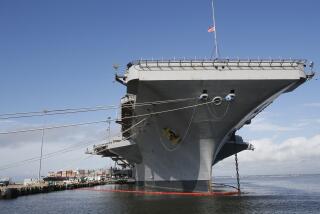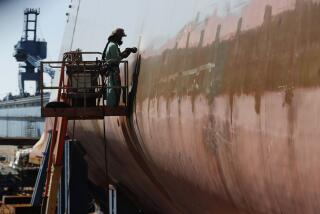Todd Changes Emphasis as Its Market Dries Up : Nation’s Largest Independent Shipbuilding Firm Stresses Repairs, Overhauls Instead of Construction
- Share via
NEW YORK — Throughout its long history, Todd Shipyards--one of whose antecedents constructed the ironclad warship Monitor of Civil War fame--has built ships for the American and foreign navies and for commercial companies.
During World War II alone, it produced more than 6 million tons of shipping, including 444 “Liberty ship” freighters, 29 tankers, 46 destroyers, 56 escort aircraft carriers and 350 landing craft.
But the marketplace in which Todd, the nation’s largest independent shipbuilding company, operates has changed radically.
The U.S. Navy is ordering relatively few new vessels. What Navy contracts Todd still has are winding down, and the company was recently outbid on several major jobs. Foreign governments are buying at home because of attractive conditions, including government subsidies and lower wage rates. Todd’s shipbuilding business has all but dried up.
Todd, based in Jersey City, N.J., is not alone with its problems. A number of other shipyards are in dire straits. Bethlehem Steel, for example, once operated 16 shipyards and employed 12,000 workers. It is down to two yards and 2,000 employees.
Temporarily, at least, Litton Industries’ and Bath Iron Works’ yards are bustling because those companies have pieces of two new Navy cruiser and destroyer construction projects. These were projects that Todd, with its modern and highly automated yards in Seattle and San Pedro, had wanted badly.
As a result of all these factors, Todd is being squeezed and its survival is threatened.
Three years ago, with the Reagan Administration’s buildup of the Navy from 450 to 600 ships, 5,000 workers were employed at Todd’s San Pedro yard. Today, the total is 1,400.
The U.S. Navy is expected to maintain its fleet at the current 600-ship level, Todd officials said, and that will require construction of only about 20 ships a year. So Todd has had to find another way of making a living. And it thinks it has been able to do so. Instead of building ships, it plans to refurbish them.
“We have made a policy decision,” John T. Gilbride Jr., president and chief operating officer, said in an interview. “Our yards are going to prosper and survive with the market we know will always be out there--Navy repair and overhaul work. If any new construction comes our way, that will be a bonus. So much the better. But this is a big change of emphasis.”
He explained that ship repair requires smaller shipyards than the huge facilities needed to build and launch ships. Engineering requirements are reduced and quality assurance requirements are less demanding than those for construction of new ships.
Todd’s shipyards in San Pedro, Seattle and Galveston are in a good position to bid on such repair and maintenance work for the Navy. In recent months, company executives said, Todd has reached favorable labor agreements with its unions at those three yards, making the company more competitive with other shipbuilding firms.
No labor agreements were reached at Todd’s San Francisco yard and it, along with others in Houston and New Orleans, will be closed as part of the downsizing of the corporation. The reductions will benefit the San Pedro shipyard since some work from the closed yards will be transferred there.
According to Gilbride, the work force at San Pedro “will function profitably at between 2,000 and 3,000, depending on the repair opportunities and if we get any construction projects.”
Seeks Foreign Contracts
At the moment, Todd is hoping to obtain two major foreign contracts, having bid to build warships for the navies of Israel and Greece. The projects, scheduled to begin in 1989, include construction of four frigates for Israel and two for Greece. Additional ships will be built in each country under the supervision of the winning contractors.
Some of Todd’s most recent ventures have caused it problems. It incurred major losses in fiscal 1987 on one commercial ship conversion contract and on a multi-ship overhaul contract for the U.S. Coast Guard. The former--the conversion of a roll-on, roll-off automobile cargo ship--was the result of a bid that company officials acknowledge was much too low. There was a 25% overrun on the project, causing a $40-million loss.
That one project caused a great proportion of the corporation’s losses in fiscal 1987.
The loss in the fourth quarter of fiscal 1987 totaled $46.8 million, compared to a net profit of $1.9 million in the same period of 1986. Largely as a result of the dismal quarterly results, the corporation reported a net loss of $44.1 million for the fiscal year that ended March 29.
Company in Default on Debts
Because of the loss, Todd is in default on its debt agreements, resulting in suspension of dividends on both preferred and common stock. And it has had to withdraw several shipbuilding bids because it could not finance them.
Earlier this month, in an effort to rescue the company, Todd shuffled its top management. David W. Wallace, an investor who has a reputation for corporate restructuring, was named chairman and chief executive. He is known as a “turnaround artist,” having performed such feats at United Brands, Alleghany Corp. and Bangor Punta.
The new management has set as its first priority the renegotiation of its bank credit agreements and the addition of capital. It is negotiating with its bankers and has hired Brown Bros. Harriman & Co. as financial adviser.
The company said several months ago that it was considering a restructuring of some kind. This, it said, could take the form of the sale of some assets or the sale of the entire company. Wallace confirmed in an interview last week that the study is still under way.
He said there are “three constituencies” of creditors that Todd must deal with.
First, he said, are the commercial banks to whom a substantial amount of money is owed. “We are in default,” he said. “We are not paying them any principal or interest, and we have no immediate prospects of paying them any principal or interest.”
Second, he said, Todd is about to go into debt to its workers’ compensation insurance company. “If we don’t have the workman’s compensation insurance,” he said, “we’ll have to close down our shipyards.”
The third constituency, he said, is made up of “the holders of $75 million of publicly held debentures traded on the New York Exchange” on which dividends have been withheld.
“All of these entities are key and they must be dealt with,” Wallace said. “We have to have a solution during the month of August. I don’t want to go into bankruptcy proceedings. That is a last resort.”
Navy Pays Bills Slowly
Wallace said in the interview that the U.S. Navy is responsible for some of Todd’s severe cash-flow problems because it frequently pays tardily for work that has been performed.
Gilbride said that a 31-ship contract Todd is just completing is a good example: The company, he said, has not yet been paid for work performed in 1981.
“We’re the Navy’s banker,” he complained. Trying to reduce its dependence on shipyard work, Todd in November, 1985, paid $87 million to acquire Aro Corp., a major international producer of air-powered equipment, including pneumatic valves and cylinders, equipment for pumping industrial fluids and lubrication products, portable tools, self-feed tools and hoists. Aro also makes life-support systems for aircraft and space-exploration vehicles.
Todd, Wallace said, hopes to achieve a 50/50 sales split between ship repair and industrial products.
“Aro is a fine company, the crown jewel,” said Wallace. “It has taken Todd on its first step toward survival.” While Todd’s shipbuilding segment incurred a net loss of $51 million in fiscal 1987, compared to a net loss of $4.2 million in fiscal 1986, Aro was a moneymaker. It had a net income of $6.9 million in fiscal 1987.
Wallace said he plans to work with members of a Texas investment partnership that recently bought nearly 10% of the Todd common stock and that owns about $20 million worth of its debentures. Wallace said he has already met with the group, called DOT Partnership of Dallas.
He said the members of the partnership “are constructive and intelligent.” But, he added, “They are in a position to block any restructuring we come up with.”
More to Read
Inside the business of entertainment
The Wide Shot brings you news, analysis and insights on everything from streaming wars to production — and what it all means for the future.
You may occasionally receive promotional content from the Los Angeles Times.










